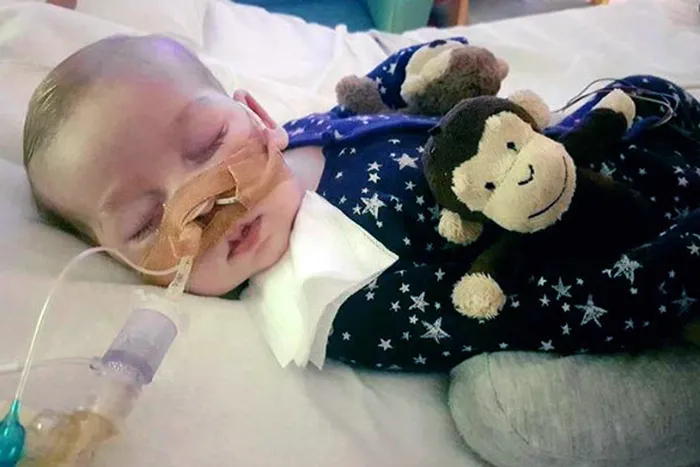
A judge has ruled that 11-month-old Charlie Gard must be moved to a hospice where his artificial ventilation will be turned off. Picture: Family of Charlie Gard via AP A judge has ruled that 11-month-old Charlie Gard must be moved to a hospice where his artificial ventilation will be turned off. Picture: Family of Charlie Gard via AP
London - Charlie Gard will spend his
final hours in a hospice before a ventilator that keeps him
alive is turned off, a judge ruled on Thursday, after a
harrowing legal battle that prompted a debate over who has the
authority to decide the fate of a sick child.
Charlie's distraught parents had been trying to find a
medical team that could look after their ailing boy in a hospice
for several days so that they could bid farewell to him just
days before his first birthday, which is due on Aug. 4.
A judge had given the parents until noon to reach agreement
with Great Ormond Street Hospital about spending more time in a
hospice, but no compromise was reached so a judge ruled that
Charlie's artificial ventilation should be turned off.
"It is not in Charlie's best interests for artificial
ventilation to continue to be provided to him and it is
therefore lawful and in his best interests for it to be
withdrawn," judge Nicholas Francis said in an order.
Francis ruled that Charlie be transferred to a hospice and
that his ventilation be withdrawn, according to a copy of the
order seen by Reuters.
He ruled that the name of the hospice and details in a
confidential annex about the arrangements for Charlie's death
should not be published.
Charlie suffers from an extremely rare genetic condition
causing progressive brain damage and muscle weakness. A
ventilator keeps him alive. He cannot move his arms or legs, and
cannot see, hear or swallow. His eyelids cannot stay open.
After reluctantly accepting that there was no hope for
Charlie, his parents, Connie Yates and Chris Gard, had sought to
take their son home to die.
But Great Ormond Street Hospital, where Charlie is being
treated, said that would not be possible due to the invasive
ventilation equipment needed to keep Charlie alive.
His parents then tried to find an intensive care doctor to
oversee a plan that would allow Charlie to be ventilated in a
hospice for several days.
A lawyer for Charlie's court-appointed guardian had told the
High Court that no hospice could provide care for intensively
ventilated children for a long time, so the parents' wish to
spend several days with him could not be fulfilled.
The tragedy for Charlie and his family snowballed into a
global debate, partly fuelled by social media, about the ethical
dilemma of whether parents, doctors or the state should decide
Charlie's fate.
Such was the prominence of the case that it even drew
comment from U.S. President Donald Trump and Pope Francis.
Charlie's parents fundamentally believed only they had the
right to decide what medical treatment Charlie received,
prompting a battle with Great Ormond Street Hospital, one of the
world's most prestigious children's hospitals.
At one point on Wednesday, Yates shouted in court,
apparently at Charlie's guardian: "What if it was your child? I
hope you are happy with yourself." She then left the courtroom
in tears.
Charlie's parents had wanted to take him to the United
States to undergo an experimental treatment never before tried
on anyone with his condition, against the advice of Great Ormond
Street doctors.
Britain's courts, backed by the European Court of Human
Rights, refused permission, saying it would prolong his
suffering without any realistic prospect of helping him.
Charlie, who suffers from an extremely rare inherited
mitochondrial disease called infantile onset encephalomyopathic
mitochondrial DNA depletion syndrome, started having seizures
before Christmas and his clinicians concluded that he had
suffered irreversible brain damage by early this year.